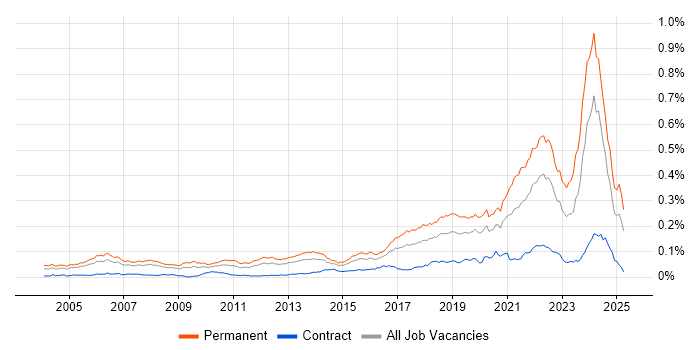Lead Software Engineer
UK
The median Lead Software Engineer salary in the UK is £95,000 per year, according to job vacancies posted during the 6 months leading to 1 May 2025.
The table below provides salary benchmarking and summary statistics, comparing them to the same period in the previous two years.
| 6 months to 1 May 2025 |
Same period 2024 | Same period 2023 | |
|---|---|---|---|
| Rank | 516 | 282 | 632 |
| Rank change year-on-year | -234 | +350 | -68 |
| Permanent jobs requiring a Lead Software Engineer | 177 | 996 | 379 |
| As % of all permanent jobs advertised in the UK | 0.34% | 1.01% | 0.36% |
| As % of the Job Titles category | 0.38% | 1.07% | 0.40% |
| Number of salaries quoted | 165 | 252 | 242 |
| 10th Percentile | £67,400 | £60,000 | £55,000 |
| 25th Percentile | £76,250 | £67,500 | £65,000 |
| Median annual salary (50th Percentile) | £95,000 | £85,000 | £83,750 |
| Median % change year-on-year | +11.76% | +1.49% | +8.06% |
| 75th Percentile | £115,000 | £123,125 | £110,000 |
| 90th Percentile | £125,000 | £153,750 | £122,500 |
| UK excluding London median annual salary | £80,000 | £70,000 | £70,000 |
| % change year-on-year | +14.29% | - | +7.69% |
All Permanent IT Job Vacancies
UK
For comparison with the information above, the following table provides summary statistics for all permanent IT job vacancies. Most job vacancies include a discernible job title that can be normalized. As such, the figures in the second row provide an indication of the number of permanent jobs in our overall sample.
| Permanent vacancies in the UK with a recognized job title | 46,902 | 93,183 | 95,132 |
| % of permanent jobs with a recognized job title | 90.12% | 94.62% | 91.53% |
| Number of salaries quoted | 27,275 | 66,883 | 59,840 |
| 10th Percentile | £30,000 | £28,500 | £32,500 |
| 25th Percentile | £42,000 | £38,500 | £45,000 |
| Median annual salary (50th Percentile) | £57,500 | £52,777 | £60,000 |
| Median % change year-on-year | +8.95% | -12.04% | - |
| 75th Percentile | £75,000 | £71,250 | £81,250 |
| 90th Percentile | £97,500 | £90,000 | £100,000 |
| UK excluding London median annual salary | £52,000 | £50,000 | £52,500 |
| % change year-on-year | +4.00% | -4.76% | +5.00% |
Lead Software Engineer
Job Vacancy Trend
Job postings that featured Lead Software Engineer in the job title as a proportion of all IT jobs advertised.

Lead Software Engineer
Salary Trend
3-month moving average salary quoted in jobs citing Lead Software Engineer.
Lead Software Engineer
Salary Histogram
Salary distribution for jobs citing Lead Software Engineer over the 6 months to 1 May 2025.
Lead Software Engineer
Top 15 Job Locations
The table below looks at the demand and provides a guide to the median salaries quoted in IT jobs citing Lead Software Engineer within the UK over the 6 months to 1 May 2025. The 'Rank Change' column provides an indication of the change in demand within each location based on the same 6 month period last year.
| Location | Rank Change on Same Period Last Year |
Matching Permanent IT Job Ads |
Median Salary Past 6 Months |
Median Salary % Change on Same Period Last Year |
Live Jobs |
|---|---|---|---|---|---|
| England | +51 | 156 | £95,000 | +11.76% | 145 |
| UK excluding London | -220 | 100 | £80,000 | +14.29% | 98 |
| London | +55 | 74 | £110,000 | -10.20% | 78 |
| Work from Home | +129 | 58 | £90,000 | -5.26% | 82 |
| North of England | +86 | 40 | £94,000 | +34.29% | 40 |
| North West | +26 | 23 | £120,000 | +71.43% | 33 |
| South West | +80 | 16 | £82,500 | +26.92% | 7 |
| Yorkshire | +82 | 15 | £80,000 | +17.65% | 3 |
| Midlands | +73 | 15 | £67,500 | -20.59% | 9 |
| South East | +67 | 11 | £95,000 | +26.67% | 29 |
| Wales | - | 11 | £77,500 | - | 2 |
| West Midlands | +43 | 9 | £67,500 | -20.59% | 3 |
| Scotland | -102 | 7 | £75,000 | -25.00% | 7 |
| East Midlands | +48 | 6 | £65,000 | -24.64% | 6 |
| North East | +51 | 2 | £75,000 | +1.35% | 4 |
Lead Software Engineer Skill Set
Top 30 Co-occurring Skills and Capabilities
For the 6 months to 1 May 2025, Lead Software Engineer job roles required the following skills and capabilities in order of popularity. The figures indicate the absolute number co-occurrences and as a proportion of all permanent job ads featuring Lead Software Engineer in the job title.
|
|
Lead Software Engineer Skill Set
Co-occurring Skills and Capabilities by Category
The follow tables expand on the table above by listing co-occurrences grouped by category. The same employment type, locality and period is covered with up to 20 co-occurrences shown in each of the following categories:
|
|
||||||||||||||||||||||||||||||||||||||||||||||||||||||||||||||||||||||||||||||||||||||||||||||||||||||||||||||||||||||||||||||
|
|
||||||||||||||||||||||||||||||||||||||||||||||||||||||||||||||||||||||||||||||||||||||||||||||||||||||||||||||||||||||||||||||
|
|
||||||||||||||||||||||||||||||||||||||||||||||||||||||||||||||||||||||||||||||||||||||||||||||||||||||||||||||||||||||||||||||
|
|
||||||||||||||||||||||||||||||||||||||||||||||||||||||||||||||||||||||||||||||||||||||||||||||||||||||||||||||||||||||||||||||
|
|
||||||||||||||||||||||||||||||||||||||||||||||||||||||||||||||||||||||||||||||||||||||||||||||||||||||||||||||||||||||||||||||
|
|
||||||||||||||||||||||||||||||||||||||||||||||||||||||||||||||||||||||||||||||||||||||||||||||||||||||||||||||||||||||||||||||
|
|
||||||||||||||||||||||||||||||||||||||||||||||||||||||||||||||||||||||||||||||||||||||||||||||||||||||||||||||||||||||||||||||
|
|
||||||||||||||||||||||||||||||||||||||||||||||||||||||||||||||||||||||||||||||||||||||||||||||||||||||||||||||||||||||||||||||
|
|
||||||||||||||||||||||||||||||||||||||||||||||||||||||||||||||||||||||||||||||||||||||||||||||||||||||||||||||||||||||||||||||
